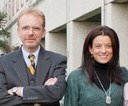FFHI Researchers Publish Papers in PNAS

The Minitopics section of this month’s issue of the American Society for Microbiology’s Microbe Magazine comments about milk oligosaccharides and bifidobacteria referring to an article authored by FFHI researchers Drs Zivkovic, Lebrilla, German and Mills. The Microbe Minitopics piece summarizes "Subspecies of Bifidobacterium longum in the gut microbiota of human infants thrive on otherwise difficult-to-metabolize oligosaccharides in human milk, apparently helping very early to establish a microbial population that is genetically compatible with its host." Read the full article here.
The other article revolves around the fact that very few Bifidobacterium grow on human milk oligosaccharides (HMOs). Researchers in David Mills' Lab at UC Davis, who work with stores of HMOs, have identified two that do: B. infantis and B. bifidum.
At Italy’s University of Parma, Professor Marco Ventura was sequencing the genomes of bifidobacteria to characterize the genetic basis to their growth on prebiotic sugars. He had tested this concept on a number of sugars, but still needed to test it on HMOs, so he sent a graduate student, Francesca Turroni, to UC Davis for six months. At Davis, Turroni worked in the Mills lab to collaborate on their experimental models of bacterial growth and metabolism on HMOs. Also participating was Dr. Jae Han Kim, who worked with Turroni to characterize the proteomic expression patterns of B. bifidum grown on various prebiotics, including HMO.
They concluded that the genes B. bifidum uses to grow on HMOs is somewhat similar to that needed for growth on mucins (molecules found on the surfaces of the gastrointestinal tract). This suggests a mechanism by which B. bifidum is able to colonize the breast fed infant colon. Read the PNAS article online.